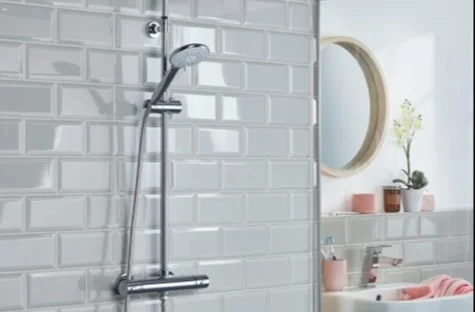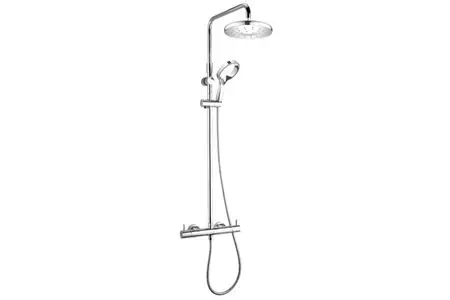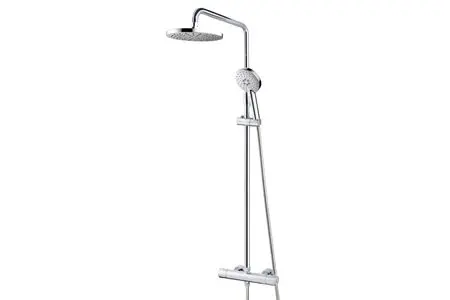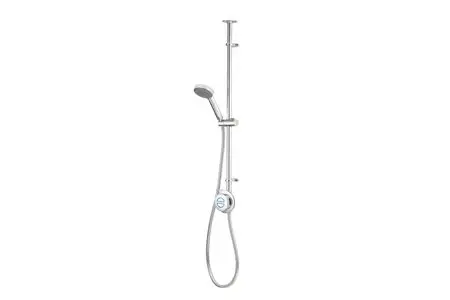As a bathroom essential, our showers are vital and the one thing we can't live without. Yet, with the cost of living continuing to rise, we’ve all had to reassess our spending. As a result, with gas and electric prices at their highest, 2022 saw big changes in our showering habits.
With energy bills continuing to dominate in 2023, taking back control of our spending will be key. Experts believe we'll see a rise in homeowners replacing their old household appliances. For many, this will start with those they use daily, such as the shower.
An energy-efficient shower could save you hundreds of pounds on your bills. Yet, a new shower doesn't have to break the bank. Here, the team at City Plumbing shines the spotlight on our energy-efficient showers.
Inefficient Showers Could Be Costing You More Than You Think
One of the biggest bathroom trends for 2023 is becoming smarter with our shower choices. And, there's never been a better time to replace your shower. Our showers keep us clean and healthy as well as offer several other benefits. For many, an immersive shower experience improves well-being and mental health.
Yet, 2022 made us all become more aware of the cost of running our showers. This was the year more of us installed and took note of our smart meters. Therefore, the cost of showering has been an eye-opener. But, if you’ve been unable to reduce your shower costs, it may well be a sign that your current model is inefficient.
Inefficient showers are one of the biggest money drainers as household appliances. If your current shower is old and worn out, it may struggle to cope and demand more energy to operate each time.

Are Showers Expensive to Run?
Waterwise claims showers are responsible for around 34% of the water consumed in our homes. Some shower models use as much as 15 litres of water each minute. Yet, using a more economical shower, this figure could be cut to as little as six litres per minute.
But every household is unique, and every shower model is different. So the amount we spend on showering will vary. One way of budgeting for your shower usage is to use a shower calculator. This breaks down how much it costs to run a single shower while helping you change your showering habits for the better.
What Makes a Shower Energy-Efficient?
- An Energy-Efficient Shower Head
Most energy-efficient showers will have an aerating shower head or a non-aerating shower head.
An aerating shower head is ideal for shorter showers as it's softer on the skin, providing a gentle showering experience. These shower heads work by restricting water flow and mixing it with air.
Meanwhile, a non-aerating shower head is vigorous, making it a little harder on the skin. This shower head produces a high-pressure flow by forcing the water through smaller holes.
- A High EPC Rating
An energy performance certificate (EPC) measures the amount of energy our appliances use. They then tell you how efficient they are on a new scale of A to G. The common letter for most homes is a D rating. So, a shower with a rating of D, C, or B is now considered energy efficient and thus will cost you less to run.
- A Smart Device Control
Smart showers will let you use a dedicated app to determine functions. Here you can control the water flow rate, and temperature, while turning the shower on and off remotely. This gives you greater control of your showering and improves efficiency.
- A Good Wattage
For electric showers, the average and most energy-efficient wattage is 8.5kW. These demand less power to heat the water and offer a plentiful supply of warm water at a gentle flow. Electric shower wattages will vary from 7.5kW to 10.5Kw.
While the higher wattage you select is more powerful, they'll also be more expensive to buy. But, if it’s a long-term energy-efficient rating you're after, 8.5kW and above is recommended.
- Quick to Reach a Comfortable Temperature
The quicker your shower can reach the desired temperature, the less time you’ll waste waiting to step into it. This means a reduction in the amount of time the shower is left running and thus a drop in running costs.
- An Eco Mode
A shower that offers the option of eco mode can help you make further savings. Eco mode is energy-efficient as it limits water consumption. This setting can help make valuable water savings as you spend less on heating your water.
Which Showers Are Best Performers When Saving Energy and Money?
Electric Showers
Electric showers explained: Electric showers are popular choices as they're suitable for many households. Quick and easy to install, they work to heat only the water that you use, so they're considered the more energy-efficient of showers. With an instant hot water supply, electric showers heat water quickly from the cold water supply. This is done via a built-in heat element.
Our recommendation for the best electric shower is the Mira Sport Max. By utilising award-winning Mira Airboost technology, this electric shower boasts powerful performance. This model increases water flow by up to as much as 30%, without using any more water.
Both power and temperature controls are separate and also powered by an on/off button. So this shower can be left at your preferred settings, ensuring less time wasted in the shower trying to get the balance just right.
What’s more, with its inclusion of Opti-Flo technology and Clearcase technology, the limescale build-up is reduced by up to 50%. The Mira Sport Max remains a consistent performer all year round, ensuring maximum efficiency long-term.

Modern Mixer Showers
Modern mixer showers explained: Modern mixer showers are also popular for their ability to blend your hot and cold water within the value of the actual shower itself. This means when the water leaves the shower head, it's reached the perfect desired temperature. What's more, thermostatic mixer showers automatically adjust to a set temperature, ensuring no sudden bursts of boiling or cold water.
Our recommendation for the best modern mixer shower is the Methven Aurajet and Satinjet.
Taking advantage of award-winning and patented technology, the Aurajet delivers 20% more performance, providing double the amount of skin contact.
This modern mixer shower also uses satinjet technology with its patented twin jets design. Thus, it creates the optimum water droplet size and pressure and delivers a staggering 300,000 plus droplets per second.
Best of all, Aurajet and Satinjet shower heads are perfectly optimised as water-efficient, providing 9l/min without compromising performance.

Traditional Mixer Showers
Traditional mixer showers explained: Traditional mixer showers also mix your hot and cold water, thus providing you with a preferred showering temperature. Yet, though they seem similar to modern mixer showers, the difference is their lack of electrical components. However, this means they provide more in the way of choice in their visual design. Traditional mixer showers offer concealed or exposed valves, hand showers, ceiling fittings, and drencher heads installation choices.
Our recommendation for the best traditional shower mixer is the iflo Ashby. Delivering 4.2 litres of water per minute at a recommended minimum bar pressure of 0.5, this shower choice is a stunning-looking addition to any bathroom.
With a high-grade chrome finish, the iflo Ashby will automatically safely shut down if cold or hot water supplies fail. This model features a fully adjustable riser rail, and there's also a luxurious 3-mode handset.

Digital Showers
Digital showers explained: Digital showers work on the same basis as mixer showers in taking and combining your hot and cold water supply to create the ideal temperature. Yet, a digital shower has the power to provide a more precise temperature setting. This is due to the thermostatic technology with this shower's mixer valve. Considered the future of showering technology, digital showers will also offer several other helpful features.
Our recommendation for the best digital shower is the Aqualisa Quartz Classic.
Boasting an impressive Eco Mode on the smart value, this digital shower allows you to make a substantial 33% water saving. There's also an LED display that tells you when your chosen temperature has been reached.
With a Mobile App and Wi-Fi enabled, you can control the Aqualisa Quartz Classic remotely. Further helping create the most energy-efficient model, this shower is thermostatically controlled with one-push button control, and an additional boost button ensures an all-around powerful shower performance.

Create an Immersive Showering-Experience on a Budget
If you’re considering replacing your current shower with an energy-efficient model, look no further than the City Plumbing website. Offering a vast selection of showers to suit, we offer showers that provide flawless all-around performance while helping you stay on budget.
For further guidance on navigating the cost of living, take a look at our sought-after help and advice section.
Other articles

Should You Lower Your Boiler Temperature?
18 Oct 2022 ・ 6 mins

A homeowners’ guide to central heating systems
22 Mar 2022 ・ 9 mins

What is a boiling water tap?
22 Mar 2022 ・ 4 mins

Smart Home Heating Controls: A Guide for Homeowners
04 Mar 2022 ・ 4 mins



